
Hilton Contemporary announces the premiere of “ADONIS – THIS IS HOW LOVE ARRIVES” a debut solo exhibition of original works on paper by 93-year-old Syrian Nobel Prize-nominated poet, critic, essayist, and translator, ADONIS.
Born in Syria in 1930, ADONIS (nee Ali Ahmad Said Esber) is considered “the greatest living poet of the Arab world.” A secularist, he was imprisoned as a young man in Syria for his political views. In 1956, he fled to exile in Lebanon, where he led a modernist movement that revolutionized Arabic poetry. He moved to Paris in 1985 where he has lived for nearly 40 years. In 1997, the French government awarded him the Commander of the Order of Arts and Letters, one of the highest honors by the French Ministry of Culture, and in 2012 named him Chevalier de la Légion d’Honneur (Knight of the Legion of Honor) for not only his poetry, but for his contributions as a thought leader.
“I am radically against violence – I am with Gandhi, not Guevara... A creator always has to be with what’s revolutionary, but he should never be like the revolutionaries. He can’t speak the same language or work in the same political environment.... I'm against an ideology based on a singleness of ideas...In our tradition, unfortunately, everything is based on unity – the oneness of God, of politics, of the people. We can't ever arrive at democracy with this mentality because democracy is based on understanding the other as different. You can't think you hold the truth, and that nobody else has it."– Adonis
Since the second half of the 20th century, Adonis has "had a seismic influence on Arabic poetry comparable to T.S. Eliot’s in the western world.” (Jaggi, Maya. The Guardian)
“His life as a poet makes him more than a writer: he is a voice. When Adonis speaks, the rest of the world stays silent to hear his word, to feel, and to think.” ~ Donatien Grau
A controversial poet, Adonis has publicly relayed his support for women’s rights and human rights throughout his lifetime. In an effort to keep the Arabic legacy alive through constant reexamination of its tenets, he continues to explore the difficult balance between tradition and modernity.

His liberal views on freedom of religion, and freedom of thought and expression, have made him a target for the conservative, fundamentalist religious groups that have polarized much of our world.
THIS IS HOW LOVE ARRIVES is the first exhibition of his collage paintings in America.
For Adonis, his art is a visual extension of his poetry, and his dissertations on love, life, peace, war. He can fashion a small stone to look like the face of St. Exupery's The Little Prince, gazing at stars encircled by lyrical images of words written in classical Arabic script; or he can splash paint onto his canvas in a brilliant amalgamation of colors that may remind one of Jackson Pollock or Sam Francis. He has an uncanny ability to layer various materials that end up being an image we can identify with. And many of his works are simple action paintings. You can feel the movement, like a ballet.
In his poetry, Adonis calls for a “leap outside of established concepts, a change in the order of things and in the way we look at them.” His work often centers not only on the process of poetic creations but a visual narrative resulting from the depth of his imagery – imagined and realized.
Arica Hilton, founder and CEO of Hilton Contemporary and Arts Poetica, states, “This summer, I traveled to Paris twice to meet this 93-year-young man of beautiful words and profound thoughts. To encounter someone like Adonis in this lifetime is a gift. He not only revolutionized modern Arabic poetry, he IS modern poetry. And with that, he has revealed a visual dialectic that transcends languages and cultures. When I saw that twinkle in his eyes as we discussed his work, I realized, this is how love arrives. I am thrilled to welcome him to Chicago.”




